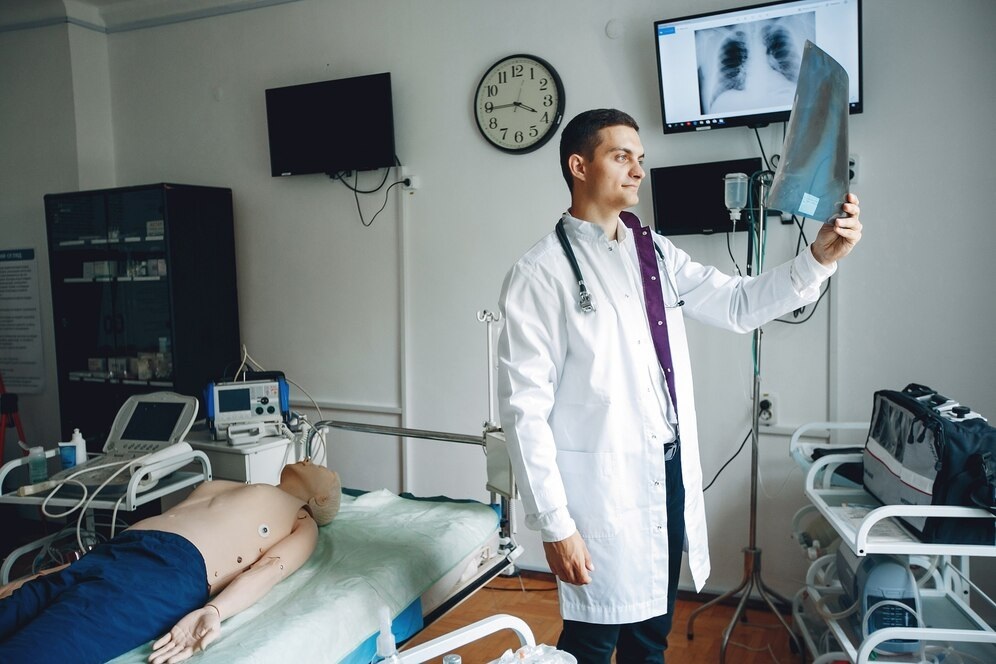Pleural effusion is a condition characterized by the buildup of fluid between the layers of tissue that line the lungs and chest cavity. Managing this condition requires specialized care and expertise. Here, we’ll delve into expert insights from Dr. Amol Bhanushali, a renowned Thoracic Surgeon, on effectively managing pleural effusion.
Understanding Pleural Effusion
Before delving into management strategies, it’s essential to understand what pleural effusion is. Pleural effusion occurs when excess fluid collects in the pleural space, the thin space between the layers of the pleura (membranes covering the lungs and lining the chest cavity). This buildup of fluid can lead to symptoms such as chest pain, shortness of breath, and coughing.
Expert Care at Dr. Bhanushali Hospital and Center for Lung Surgery
Dr. Amol Bhanushali, a leading lung surgeon in Thane, is renowned for his expertise in thoracic surgery and the management of conditions like pleural effusion. At Dr. Bhanushali Hospital and Center for Lung Surgery, patients receive personalized care and advanced treatment options for pleural effusion.
Diagnosis and Evaluation
Dr. Bhanushali emphasizes the critical role of precise diagnosis and thorough evaluation when managing pleural effusion. This process is vital to determine the underlying cause and severity of the condition, enabling tailored treatment plans for each patient.
Diagnosis typically begins with a comprehensive physical examination, where Dr. Bhanushali assesses symptoms and medical history. Following this, imaging tests such as chest X-rays or CT scans are often conducted to visualize the pleural space and identify any fluid accumulation or underlying lung conditions.
Additionally, in some cases, procedures like thoracentesis may be necessary. Thoracentesis involves inserting a needle into the pleural space to withdraw fluid for analysis, aiding in the diagnosis of the underlying cause of pleural effusion, whether it’s related to infection, inflammation, heart failure, or other medical conditions.
This meticulous diagnostic approach ensures accurate assessment and guides effective treatment strategies tailored to each patient’s needs.
Treatment Approaches
Treatment for pleural effusion depends on its underlying cause and severity. Dr. Amol Bhanushali adopts a multidisciplinary approach to tailor treatment plans for each patient. Some common treatment approaches include:
- Thoracentesis: Draining excess fluid from the pleural space to relieve symptoms.
- Medications: Prescribing medications such as diuretics or antibiotics to treat underlying conditions like heart failure or infections.
- Pleurodesis: A procedure to seal the pleural space and prevent fluid accumulation.
- Thoracic Surgery: In cases of recurrent or complicated pleural effusion, surgical interventions may be necessary to remove the fluid or address underlying issues.
Recovery and Follow-up
After treatment, Dr. Amol Bhanushali emphasizes the importance of follow-up care to monitor the patient’s condition and prevent recurrence. Regular check-ups and imaging tests may be recommended to ensure optimal recovery.
Prevention and Lifestyle Management
In some cases, lifestyle modifications may help prevent pleural effusion, especially in conditions like heart failure. Dr. Bhanushali advises patients on maintaining a healthy lifestyle, managing underlying health conditions, and seeking prompt medical attention for any symptoms.
Conclusion
Managing pleural effusion requires a comprehensive approach with the guidance of experienced specialists like Dr. Amol Bhanushali, a respected lung surgeon in Thane. With expertise in thoracic surgery and a commitment to patient-centered care, Dr. Bhanushali and his team at Dr. Bhanushali Hospital and Center for Lung Surgery provide advanced treatments and support to patients dealing with pleural effusion, ensuring the best possible outcomes and improved quality of life.
FAQs
How can I recognize the symptoms of pleural effusion?
Common symptoms of pleural effusion include chest pain, shortness of breath, coughing, and difficulty breathing. If you experience any of these symptoms, it’s essential to consult a healthcare professional for evaluation.
What diagnostic tests are used to identify pleural effusion?
Diagnostic tests may include a physical examination, imaging tests such as chest X-rays or CT scans, and sometimes, procedures like thoracentesis to analyze the fluid in the pleural space.
When should I seek medical attention for pleural effusion?
If you experience symptoms such as chest pain, difficulty breathing, or persistent coughing, it’s important to seek medical attention promptly. Early detection and intervention can reduce the risk of problems.
How do I know if I need surgery for pleural effusion?
The need for surgery depends on factors such as the underlying cause, severity of symptoms, and response to other treatments. Dr. Amol Bhanushali will evaluate your condition and recommend the most appropriate treatment plan.
What is the recovery process like after pleural effusion treatment?
Recovery varies depending on the treatment received and individual factors. Dr. Bhanushali will provide guidance on post-treatment care, including follow-up appointments and lifestyle recommendations.

